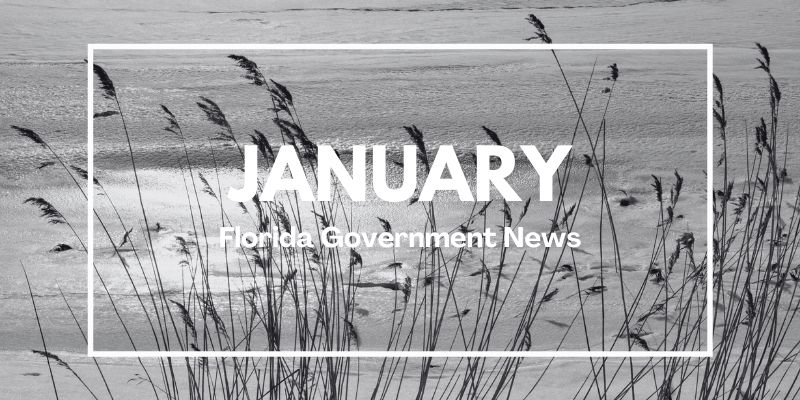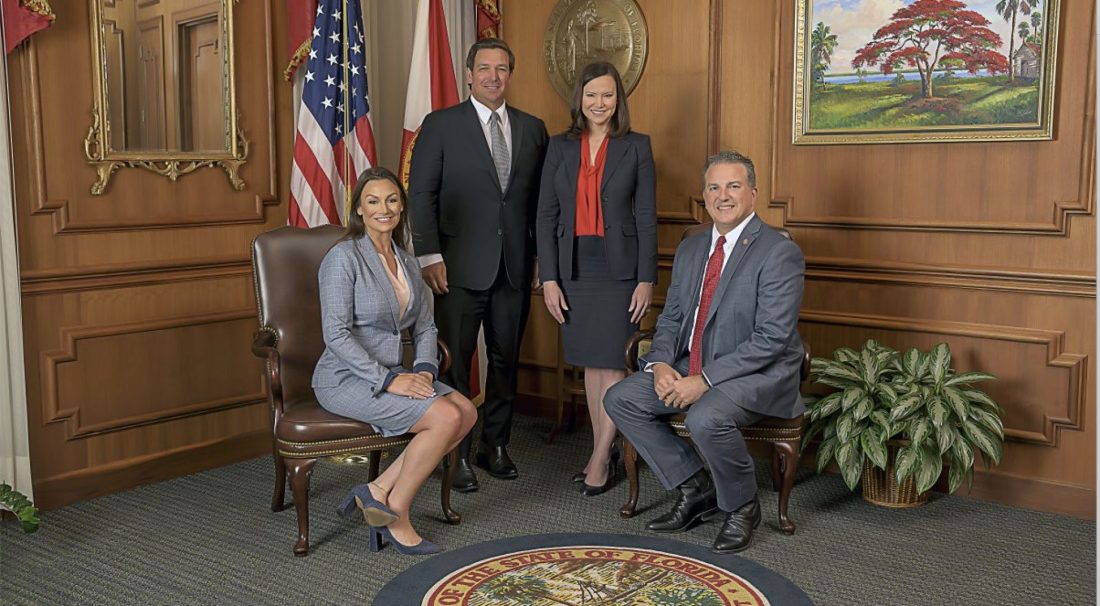
Redistricting
Previously, we reviewed the progress to date on the redrawing of Florida’s congressional and state legislative district maps. (Sparker’s Soapbox, 1/7/22)
Since then:
Voting Rights Groups Question Process
The League of Women Voters of Florida and the Fair Districts Coalition asked whether enough research into minority protection had gone into the Senate’s mapmaking. Senate Reapportionment Committee Chair Ray Rodrigues said that the Committee’s maps met legal standards. (Florida Politics, 1/13/22; Florida Phoenix, 1/18/22; LWV of Florida Statement, 1/18/22)
DeSantis Weighs In on Congressional Map
Soon after the Senate Committee approved its proposed maps, Gov. DeSantis took the almost unprecedented step of issuing his own proposal. (Florida Politics, 1/17/22; P 0079)
Experts said DeSantis’s map would hurt Black and Hispanic voting power. (Orlando Sentinel, 1/18/22; Florida Phoenix, 1/18/22)
Senate and House Maps Move Forward
In a rare public rebuke, senators ignored the governor’s proposal and passed their committee’s version of a congressional map (CS/SB 102) as well as its state senate map (CS/SJR 100) with nearly unanimous (34 – 3) bipartisan support. (Miami Herald, 1/20/22)
However, the House split along party lines in approving its map by a vote of 77 – 39. Democrats anticipate legal challenges about minority representation and how the lines were drawn. Although Florida’s population is significantly more diverse than a decade ago, the proposed legislative districts as drawn are not. (News Service of Florida via News4Jax.com, 2/3/22)
The maps are now ready to go to the Florida Supreme Court for a final review before becoming law to take effect for the 2022 election cycle. They position Republicans to remain in control of the Legislature for the next decade. But the once-a-decade process of redistricting rarely concludes with a legislative vote, as the maps have been historically challenged in court. (Miami Herald, 2/3/22)
Congressional Map Remains Unresolved
Meanwhile, Gov. DeSantis, who has veto authority over the congressional map, has asked the state Supreme Court to review the legality of a Tallahassee-to-Jacksonville congressional district currently held by Democrat Al Lawson. DeSantis’ plan would eliminate that district, as well as one now held by Democrat Val Demings in the Orlando area, cutting by half the four seats seen as likely to send a Black representative to Washington. Following the Governor’s action, the House canceled a scheduled meeting to finalize its proposed congressional map. (News Service of Florida via News4Jax.com, 2/3/22)
The court set a deadline of noon Feb. 7 for “interested persons” to submit briefs. The new legislative and congressional districts need to be in place before qualifying for this year’s elections begins June 13. (Associated Press via wpbf.com, 2/3/22)
2022 Legislative Session
The 2022 Legislative Session convened on Jan. 11 with Gov. DeSantis laying out his agenda in his State of the State address.
The Florida legislative leaders for the 2022 session are Senate President Wilton Simpson, R-Trilby; incoming Senate President Kathleen Passidomo, R-Naples; Senate Minority Leader Lauren Book, D-Plantation; House Speaker Chris Sprowls, R-Palm Harbor; incoming House Speaker Paul Renner, R-Palm Coast; and House Minority Leader Evan Jenne, D-Dania Beach. (Tampa Bay Times, 1/11/22)
Leaders’ Opening Remarks
Gov. DeSantis mentioned policy goals ranging from attempts to prevent schools and businesses from teaching critical race theory to keeping undocumented immigrants from settling in Florida. He also proposed “an election integrity unit whose sole focus will be the enforcement of Florida’s election laws” and wanting to “strengthen protections for the right to life,” including continued efforts to promote adoption and foster care. (wfla.com, 1/12/22; DeSantis remarks)
Senate President Simpson mentioned raising the minimum wage for state workers and higher wages for law enforcement and corrections officers, first responders, school staff, and state employees; investment in roadways, seaports, and the environment; and continued improvements to the child welfare system. (Florida Politics, 1/11/22; Simpson remarks)
House Speaker Sprowls said the House would look at the state’s “risk portfolio,” including improving cybersecurity infrastructure and addressing the threat of hurricanes. (Florida Politics, 1/11/22; Sprowls remarks)
Later on opening day, Sprowls’ office released a list of his five priority bills. (USA Today Network-Florida Capital Bureau via The News-Press, 1/11/22; News Release)
Bills to Implement DeSantis’ Priorities
Bills to address leaders’ priorities — especially those the governor supports — are generally likely to move quickly and to become law, given Republican control of both legislative chambers.
Proposals to implement DeSantis’ priorities include:
SB 148 / HB 7: Individual Freedom would prohibit public schools and private businesses from inflicting “discomfort” on white people during lessons or training about discrimination. (Critical Race Theory, an academic concept based on the idea that racism is not about individual people’s prejudices but about institutions and policies, is not currently taught in Florida’s public schools.)
- Florida bill to shield people from feeling ‘discomfort’ over historic actions by their race, nationality, or gender approved by Senate committee. (CNN.com, 1/20/22)
SB 1808 / HB 1355: Immigration Enforcement would bar the state and local governments from contracting with transportation companies “if the carrier is willfully providing any service in furtherance of transporting an unauthorized alien into the State of Florida knowing that the unauthorized alien entered into or remains in the United States in violation of law.”
- Following Gov. DeSantis lead, immigration bill gets backing In Florida House. (CBSMiami.com, 2/4/22)
CS/SB 524: Election Integrity creates a 15-person Office of Election Crimes and Security within the Secretary of State’s Office; requires supervisors of elections to conduct voter list maintenance annually; requires voters to include the last four digits of their Social Security number or voter ID number on their vote-by-mail certificates; makes the penalty for possessing more than two ballots other than those of a family member a third-degree felony instead of a misdemeanor; bans local governments from implementing ranked-choice voting to avoid local election runoffs.
- Florida Senate has new batch of voting proposals, including DeSantis’ investigators. (Bradenton Herald, 2/1/22)
S 146 / CS/HB 5: Fetal and Infant Mortality Reduction bans nearly all abortions after 15 weeks, with exceptions for pregnancies where the mother’s life or serious bodily function are in danger, or when there is a fatal fetal abnormality. It would implement some of the strictest abortion limitations in the nation.
- Senate Republicans push abortion bill through first committee stop. (Florida Politics, 2/2/22)
Bills to Implement Simpson’s Priorities
SB 7034: Child Welfare increases monthly payments for foster parents and caregivers and other assistance aimed at benefiting the lives of foster youth.
- Senate wants to boost benefits for foster families, but can Wilton Simpson get the money he needs? Florida Politics, 1/18/22
$15 minimum wage for Florida’s public school workers: A Senate budget proposal would provide “for an expectation that all school districts will ensure that every employee is paid at a minimum wage of at least $15 per hour beginning in” the 2022-2023 school year.
Bills to Implement Sprowls’ Priorities
HJR 1: Additional Property Tax Exemption for Critical Public Service Workers proposes an amendment to the State Constitution to create another homestead exemption on the assessed value of property from $100,000 to $150,000 for eligible first responders, teachers and military members.
- Property tax break for first responders and teachers advances in House. (Florida Politics, 1/31/22)
HB 3: Law enforcement support provides law enforcement agencies with additional tools to bolster the recruitment and retention of qualified officers, including financial incentives, enhanced training, and expanded educational opportunities.
- Bill boosting law enforcement recruitment passes second committee. (Florida Politics, 1/31/22)
SB 146 / HB 5: Fetal and Infant Mortality Reduction — see DeSantis priority, above.
SB 148 / HB 7: Individual Freedom — see DeSantis priority, above.
HB 9: Consumer Data Privacy requires notice of data collection, sharing, and selling practices; provides right to request data be disclosed, deleted, or corrected and to opt-in or opt-out of sale or sharing of data; preempts regulation to the state.
- Data privacy redux? House, Senate stake familiar positions on suing tech companies. (Florida Politics, 1/12/22)
Florida Executive Branch
Florida residents are represented in the Executive Branch of state government by an elected Governor, Attorney General, Chief Financial Officer, and Commissioner of Agriculture.
Meet the Executive Branch

New COVID-19 Testing Guidelines
Amid a surge in cases caused by the highly contagious Omicron variant, acting Surgeon General Joseph Ladapo and the Florida Department of Health released new guidelines for COVID-19 testing on Jan. 7. Only residents with symptoms of the virus who are considered high-risk should get tested according to the new recommendations. All others, even those who have come in contact with an infected person, are encouraged to wait until symptoms appear. The new guidance directly contradicts the federal CDC’s suggestions for testing. (WMFE Public Media, 1/7/22)
OSHA Rule Struck Down; Health Worker Mandate Stands
In a win for DeSantis, the U.S. Supreme Court struck down the Biden administration’s vaccine-or-test OSHA rule. But the Court upheld the CMS mandate requiring all staff of healthcare facilities that receive Medicaid and Medicare funding be vaccinated or have a qualifying exemption. For background, see Sparker’s Soapbox, 1/7/22. (NPR.org, 1/13/22; Tallahassee Democrat, 1/14)
Despite the Court’s ruling, the Florida Department of Health said it will not enforce the CMS law, which conflicts with a state law that limits employers’ ability to mandate vaccines. (USA Today Network-Florida via Tallahassee Democrat, 1/14/22)
The conflicting laws create a dilemma for Florida health care companies. If they do not abide by the CMS requirement, they risk losing Medicare or Medicaid funding. If they enact the federal mandate without offering employees a series of state-specified exemptions, small firms risk a $10,000 state fine every time they fire a worker for being unvaccinated. For larger companies, the fine would be $50,000 per violation. (Miami Herald, 1/14/22)
Cruise Ship COVID-19 Restrictions Expire
Federal government attorneys dropped their appeal in Florida’s battle against CDC restrictions on the cruise-ship industry. The CDC let expire its “conditional sailing order” that placed COVID-19 restrictions on the industry. (News Service of Florida via The Capitolist, 1/19/22)
County Health Director Placed on Leave
On Jan. 19, the Florida Department of Health placed the Orange County Health Director on leave for encouraging his staff to get vaccinated. (The News-Press, 1/19/22)
Ladapo Confirmation Hearings Underway
Surgeon General nominee Dr. Joseph Ladapo is one step closer to confirmation. Republicans quickly advanced the nomination after an hour of grilling by Democrats at a Senate Health Policy Committee hearing. Democrats walked out in frustration at not getting answers to their questions. The nomination will next be heard by another Senate committee and then by the full state Senate. For background, see Sparker’s Soapbox, 9/29/21. (Tampa Bay Times, 1/26/22)
AG Moody Warns of COVID-19 Testing Scams
Florida Attorney General Ashley Moody warned residents about COVID-19 testing scams as coronavirus cases surged in the state. According to Moody’s office, there were reports in Florida and nationwide of potentially fake testing sites, imposter health care workers at legitimate sites, and at-home testing scams. (Sarasota Herald-Tribune, 1/7/22)
Governor’s Appointment Power
In August, Gov. DeSantis appointed Shawn Hamilton to be secretary of the Florida Department of Environmental Protection. Commissioner of Agriculture Nikki Fried challenged DeSantis’s unilateral authority to do so. Fried, who is running against DeSantis for governor, says state law requires that the appointment receive unanimous approval of the three members of the Cabinet. (Tampa Bay Times, 9/1/21)
A proposed new law is being fast-tracked through the Senate that would conform state law to DeSantis’ reading of the constitution. It would give the governor the choice to seek the Cabinet’s unanimous support or the Senate’s majority support. (Florida Politics, 1/18/22; SB 1658)
News from Washington
All Florida voters elect the state’s two U.S. Senators.
Florida’s U.S. Senators are Marco Rubio and Rick Scott.
Key Votes in the U.S. Senate
Senate Republicans block voting rights bills; prevent filibuster change. (NYTimes, 1/19/22)
Republicans stymied action on a voting rights bill that would counter an onslaught of new voting restrictions around the country. A last-ditch bid by Democrats to alter the Senate’s filibuster rules and allow the measure to move forward with a simple majority also failed.
Rubio — Nay; Scott — Nay
Failed: 49 – 51 on 1/13/22
Senate rejects Nord Stream 2 sanctions bill. (Foreign Policy, 1/13/22)
The U.S. Senate narrowly voted against new sanctions on a controversial Russian pipeline project in Europe that became a political lightning rod in Washington. The measure failed to gain the 60 votes needed to pass.
S. 3436: Protecting Europe’s Energy Security Implementation Act
Rubio — Yea; Scott — Yea
Failed: 55 – 44 on 1/13/22
That’s it for Florida government news for January 2022.
